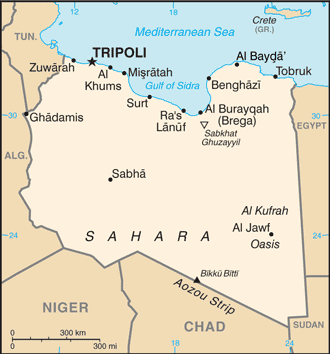Investing in Libya


The Libyan economy depends primarily upon revenues from the oil sector, which contribute about 95% of export earnings, 25% of GDP, and 80% of government revenue. The weakness in world hydrocarbon prices in 2009 reduced Libyan government tax income and constrained economic growth. Substantial revenues from the energy sector coupled with a small population give Libya one of the highest per capita GDPs in Africa, but little of this income flows down to the lower orders of society. Libyan officials in the past five years have made progress on economic reforms as part of a broader campaign to reintegrate the country into the international fold. This effort picked up steam after UN sanctions were lifted in September 2003 and as Libya announced in December 2003 that it would abandon programs to build weapons of mass destruction. The process of lifting US unilateral sanctions began in the spring of 2004; all sanctions were removed by June 2006, helping Libya attract greater foreign direct investment, especially in the energy sector. Libyan oil and gas licensing rounds continue to draw high international interest; the National Oil Corporation (NOC) set a goal of nearly doubling oil production to 3 million bbl/day by 2012. In November 2009, the NOC announced that that target may slip to as late as 2017. Libya faces a long road ahead in liberalizing the socialist-oriented economy, but initial steps - including applying for WTO membership, reducing some subsidies, and announcing plans for privatization - are laying the groundwork for a transition to a more market-based economy. The non-oil manufacturing and construction sectors, which account for more than 20% of GDP, have expanded from processing mostly agricultural products to include the production of petrochemicals, iron, steel, and aluminum. Climatic conditions and poor soils severely limit agricultural output, and Libya imports about 75% of its food. Libya's primary agricultural water source remains the Great Manmade River Project, but significant resources are being invested in desalinization research to meet growing water demands.
Central Bank of Libya - http://www.cbl-ly.com/
Occidental Petroleum (NYSE: OXY) - http://www.oxy.com/
Libya News
The Tripoli Post - http://www.tripolipost.com/
Countries that border Libya: Tunisia | Algeria | Niger | Chad | Sudan | Egypt
Learn more:
Back to Country Investing



